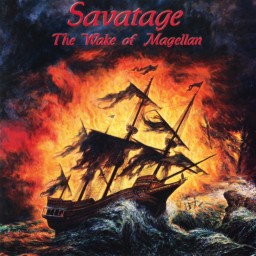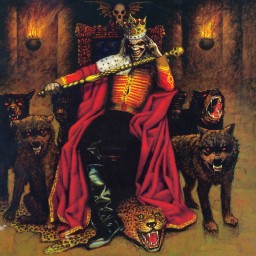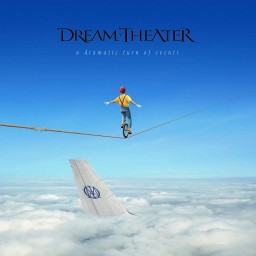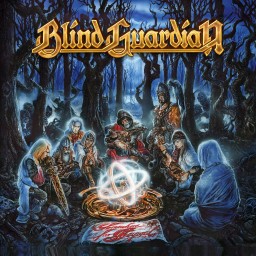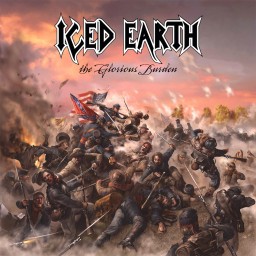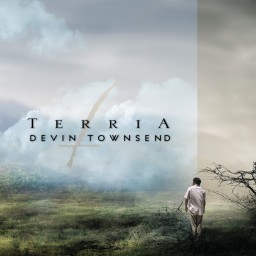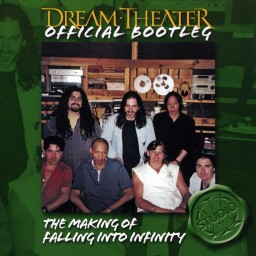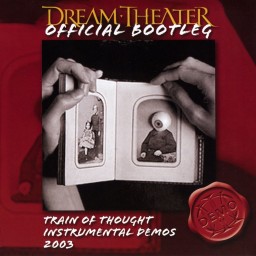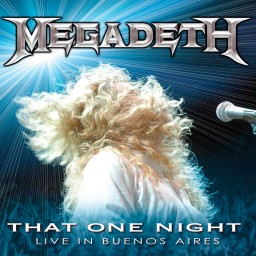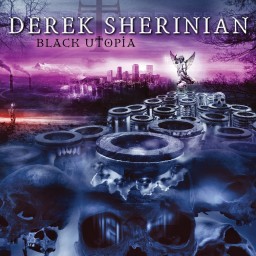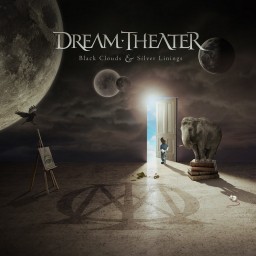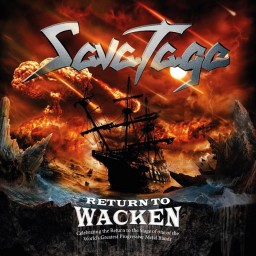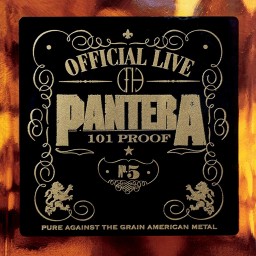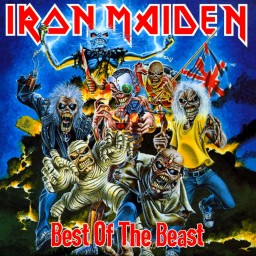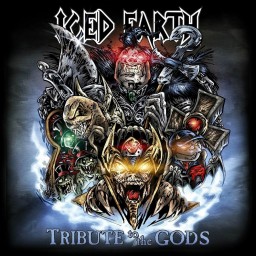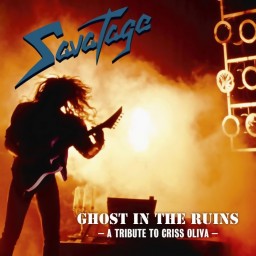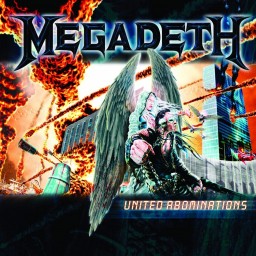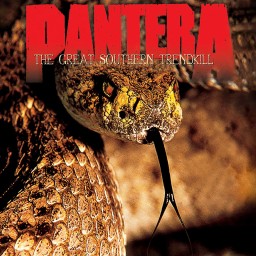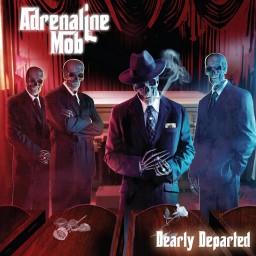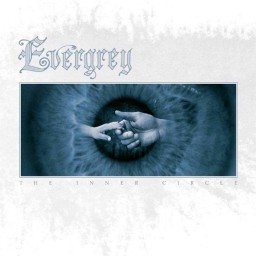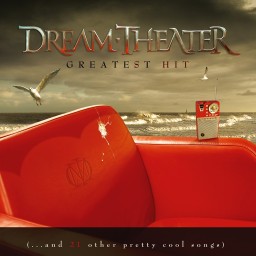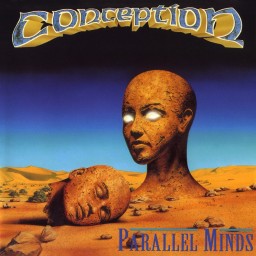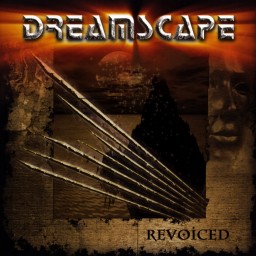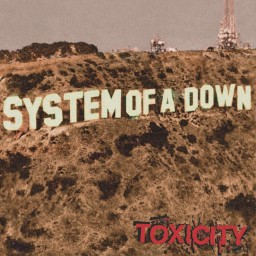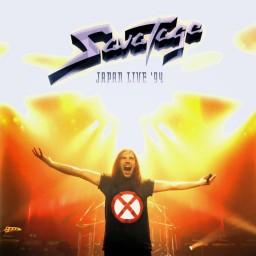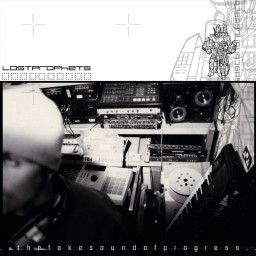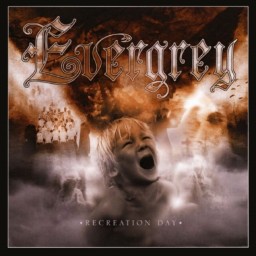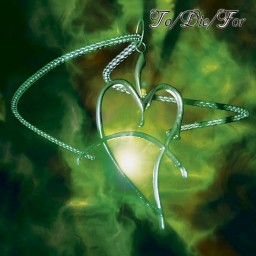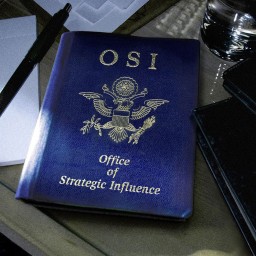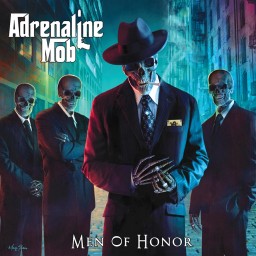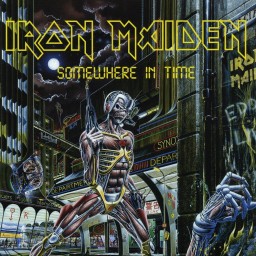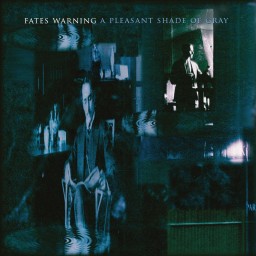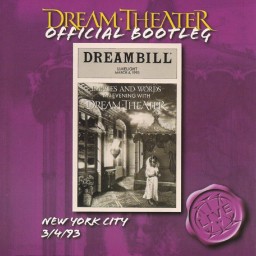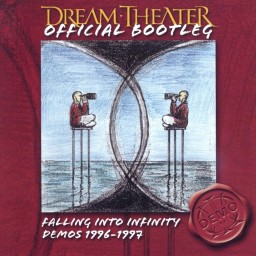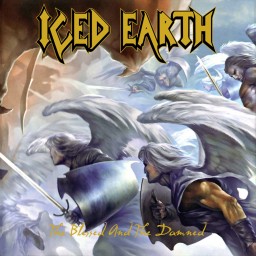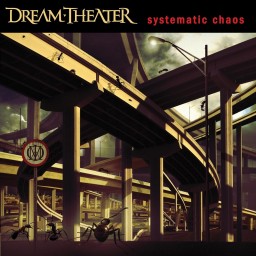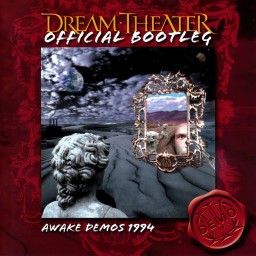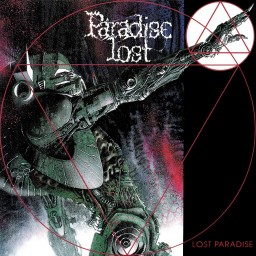MartinDavey87's Reviews
After their 1995 concept album 'Dead Winter Dead', which spawned a small radio hit for the band, and the recently-formed Trans-Siberian Orchestra, which also garnered mainstream success, Savatage continue down the route of epic rock operas which would see the band reach new heights of creativity and critical acclaim during the late 90's.
Featuring all the pomp and circumstance that the band had incorporated into their sound since 1994's 'Handful of Rain', and even way before that if I'm being realistic, 'The Wake of Magellan' sees everything come together for Savatage. The story itself doesn't really make much sense to me, but it ties around the fictional story of a sailor who goes out to sea to end his life, only to find new meaning to carry on, and two real-life events involving a journalist who was murdered whilst trying to battle the growing drug trade in 90's Ireland, and of a sea captain who had Romanian stowaways thrown overboard.
How does any of this fit together? I have no idea (and I doubt many people do), but the music itself is compelling and the performances are sincere. That's good enough for me!
Using the same lineup from the previous album, the band have really gelled by this point, and the chemistry is evident. Zak Stevens delivers powerful vocals as always, and founding member Jon Oliva returns to sing for a number of songs, having never sounded better or more confident. His keyboards add a warm depth to the record as well, giving it that orchestral feeling but without all the pomposity of a full orchestra.
'Turns to Me', 'Morning Sun', 'Another Way', 'Paragons of Innocence' and 'The Hourglass' are all highlights that this fantastic album has to offer, with the true gem being the title track, 'The Wake of Magellan'. It's a big, epic piece, with an absolutely mind-blowing finale which sees the band utilize the vocal harmony counterpoint which they had used more and more over the last few releases, but perfected here.
A truly underrated gem when it comes to concept albums, capturing the very essence and atmosphere of a journey out to sea, 'The Wake of Magellan' is an absolute epic from start to finish.
Genres: Heavy Metal
Format: Album
Year: 1997
With Kamelot's third studio album comes a major turning point in the bands history for two reasons. Number one being that with 'Siege Perilous', keyboards started to play a more pivotal role in the music, as opposed to previous releases where it was used sparingly in the background. And number two, of course, is the addition of former Conception frontman Roy Khan, a man who's distinct voice would go on to give Kamelot the identity they needed in order to stand out from the other power metal bands.
Unfortunately, these changes didn't instantly bring huge success upon the band, and while this is a good effort, it tends to feel more like a transitional period for the band as they begin to truly develop their own style.
Of course, that doesn't make this a bad album. Although there are a few rather forgettable tracks here, there are others that ooze of Kamelot's medieval-inspired charm. Songs like 'Providence', 'Parting Visions' and 'Irea' are all up there as some of the bands most memorable moments.
The addition of Khan and more prominent keyboards have laid down a path for where the band are headed in the future, but this still remains as nothing more than a good album. The symphonic elements are starting to materialize, though they're simplistic compared to future releases. Still, 'Siege Perilous' is a step in the right direction for Kamelot.
Genres: Power Metal
Format: Album
Year: 1998
Released in 2002, 'Edward the Great' is a compilation album by Iron Maiden that focuses mainly on the bands singles and "hits", as opposed to songs that are generally favored by fans. As a result, while it's a decent enough selection, it's also very predictable.
Of course, the music itself is still great! I mean, come on, it's Iron freaking Maiden! 'Run to the Hills', 'The Trooper', 'Can I Play With Madness', '2 Minutes to Midnight' and 'The Number of the Beast'... these are all iconic metal classics! However, there's a lot of songs missing, even by 2002, there was an absolute wealth of material that should have been included on a release such as this, but wasn't due to time limitations.
Overall, you're better off going for 'Best of the Beast', especially if you're new to the band. Despite being released six years earlier, it has a more well-rounded track listing, and the packaging as a whole is a lot nicer, with more pictures and detailed information on the band. Leave 'Edward the Great' to collectors like me.
Genres: Heavy Metal
Format: Compilation
Year: 2002
25 years after their inception, 2010's aptly titled 'A Dramatic Turn of Events' ushers in an era Dream Theater fans thought they'd never see, for this was the first release after the departure of drummer and founding member Mike Portnoy.
With the prog world eagerly anticipating who would have the impossible task of replacing one of the greatest drummers in the world, the band announced a new album and, via an online documentary, unveiled that man to be none other than Mike Mangini, who's résumé includes the likes of Steve Vai, Annihilator and Dream Theater frontman Jame LaBrie's solo project, proving him to be a more than competent successor.
However, other than the inclusion of a new drummer, this is pretty much a by-the-numbers release. Big, epic songs, which display a vast array of heavy, crushing riffs, beautiful and haunting keyboard melodies, an unlimited supply of instrumental mastery and James LaBrie's powerful vocals. It's clear that the drama of the past year hasn't prevented the prog legends from doing what they do best.
I was saddened though, as I'm sure many others were, to hear that Mike Mangini didn't have any creative input in the compositions for 'Dramatic...', as they were written before he joined the group, leaving him to play session musician. It's not really a detriment to the album, but I was more than a little excited to see what musical differences Mangini would bring to the table.
Some of the highlights from 'A Dramatic Turn of Events' includes the single 'On the Backs of Angels', and the longer, more epic tracks 'Bridges in the Sky' and 'Outcry'. The shorter, "metal" tracks such as 'Lost Not Forgotten' and 'Build Me Up, Break Me Down' show that guitarist John Petrucci can always be relied upon to produce riffs that put most metal bands to shame, and ballads like 'This is the Life' and 'Far from Heaven' soften the mood to enable listeners to catch their breath.
With their eleventh studio outing comes a landmark release in Dream Theater's discography, which, while it's a remarkable piece of work in itself, will always be known as the first of the post-Portnoy era. It's a good sign that the band are ready to continue on, and can only leave one excited to see where they will go from here.
Genres: Progressive Metal
Format: Album
Year: 2011
Blind Guardian’s fourth studio album, ‘Somewhere Far Beyond’, was released in 1992, and follows on from the bands previous three albums, in which this is mostly generic power/speed metal, but with outside influences creeping in. Prior to this the band had dabbled with folk and Gaelic influences, and here the band incorporates subtle medieval and pop influences.
Overall however, this is still very much a power metal album, and much like the bands prior efforts, I struggle to really pick out many highlights. The production has been improved, making the music heavier and giving it more clarity and depth, but the writing overall is still pretty lacking, with most songs having uninspired guitar riffs and bland melodies throughout.
Now, I know this is sacrilegious, but hear me out! I swear, I do love Blind Guardian! But this is a simple matter of taste. I love the bands later material, the epic, orchestral and progressive stuff. So perhaps this is what these earlier albums are missing? Because all I’m hearing here is one speed riff after another.
If I had to pick out any highlights, opening track ‘Time What is Time?’ is decent enough, and ‘Theatre of Pain’ introduces some of the more orchestral elements that the band would really excel at, but ultimately, probably the most memorable track from this album is a cover of Queen’s ‘Spread Your Wings’, which, while Blind Guardian do a great job of this, truly making it sound like one of their own songs, it also speaks volumes about the quality of their own material, at this point, anyway.
To any fans that are furious at my blasphemy, I swear, I love this band, I really do! But it would just seem that these earlier, straight-up power metal albums just aren’t for me. Bring on the concept albums and orchestras!
Genres: Power Metal
Format: Album
Year: 1992
Eight albums into their career, and Iced Earth’s output was proving to be very hit-or-miss with me. Sure, they’d released some absolute masterpieces, such as their self-titled debut, its follow-up ‘Night of the Stormrider’ and 1998’s ‘Something Wicked This Way Comes’, but they’d also put out some very sub-par stinkers, such as ‘The Dark Saga’ and ‘Horror Show’. And so, with their ninth studio album, 2003’s ‘The Glorious Burden’, the rollercoaster ride continues, as the American power metal quintet once again are on top form.
Most notable here is the addition of new vocalist ‘The Ripper’ Tim Owens. Recently ousted from Judas Priest, this was a huge score for Iced Earth after the departure of long-time singer Matt Barlow. Owens’ powerful voice is not only a great fit for the group without copying his predecessor, but it sounds like it sparked a few creative juices for band leader Jon Schaffer, who was probably as motivated by the new recruit as he was by his passion of the albums theme; military history.
Musically, this is classic Iced Earth and very typical power metal; lots of fast guitars and harmonies, galloping bass lines and rich orchestrations. But the song-writing is solid and very inspired, and Tim Owens’ vocals are absolutely perfect for this band, replacing Barlow with ease and really giving this album an identity of its own.
With highlights including ‘Declaration Day’, ‘The Reckoning (Don’t Tread On Me)’, ‘Greenface’, ‘Attila’ and the epic three-part ‘Gettysburg (1863)’, this is a banger of an album that furthers Iced Earth’s erratic discography, but shows that when the right pieces fall into place, this band rocks seriously hard.
Genres: Heavy Metal Power Metal
Format: Album
Year: 2004
I never considered myself much of a fan of this whole "experimental/post metal/tech metal" thing (I don't really understand what any genre of music with the word "post" in it means). I bought this album because it was cheap. I knew of Devin Townsend by reputation, but have never thought of myself as a fan. He did produce Stuck Mojo's 'Pigwalk' though, and that album is bloody brilliant!
But 'Terria'... one great big ball of "meh" from me. I find most of the songs too slow paced for my liking. Not that I mind slower songs, but these ones just plod along uninterestingly. Other than two songs, 'Earth Day' and 'Nobody's Here' (admittedly, two very good songs), I find most of the album boring. There's nothing catchy or memorable that incites anything from me other than dreariness.
The record does have a very "big" sound, and the vocals blend in with the music very well to create an almost dreamlike ambience. Sadly it just doesn't do anything to make the album any more appealing to me.
Devin Townsend's 'Terria' is not awful by any stretch, but it's just really not my thing. Simple as that.
I'd rather listen to Stuck Mojo!
Genres: Progressive Metal
Format: Album
Year: 2001
Dream Theater’s Official Bootlegs series has always been a nice touch for collectors, whether it’s demos, live recordings, compilations, or reissues of previous fan club CD’s (which is actually what this one is), they’re usually pretty cool little nuggets of joy for die-hard fans of the band.
And occasionally, there’s utter nonsense like this.
‘The Making of Falling Into Infinity’ is completely and utterly pointless. Not containing any full tracks, the entire album is nothing more than snippets of songs. Guitar riffs, the odd vocal harmony, someone working out a part or someone saying something. It might be interesting for some tech nerd who wants to look into the process of writing and recording an album, but without any commentary or narrative, this CD really is unlistenable.
I can understand with demos that at least it’s interesting to listen to how songs were originally intended to sound and how they’ve evolved to become the finished product, but this is completely useless and doesn’t even show us that. Die-hard fans who must own everything will probably resent having to purchase this, and I’d know, because I’m one of them.
Genres: Progressive Metal
Format: Compilation
Year: 2009
What we have here is the perfect example of why the official bootlegs line was created in the first place. Average demos of an amazing album. Mike Portnoy's OCD of recording and documenting everything and hey, people will pay money for it, why not release it?!
It's easy to tell that drummer Mike Portnoy and guitarist John Petrucci were producing this, as they're most certainly louder than everything else. In particular, poor Jordan Rudess' keyboards are barely audible. Still, I guess I'd be clutching at straws if I said it's an interesting look at the development of a Dream Theater album.
Different arrangements, sloppy guitar solos (blasphemy!), a few mistakes from Jordan Rudess (impossible!)... It's not that this is a bad release, it's just that you really shouldn't own something like this unless you're a die-hard Dream Theater fan. Otherwise, just get the actual 'Train of Thought' release... duh!
And 'Train of Thought' is a damn brilliant album! So yeah... get that instead!
Genres: Progressive Metal
Format: Compilation
Year: 2009
Well, it’s official. If 2001’s ‘Rude Awakening’ didn’t prove it, then ‘That One Night: Live in Buenos Aires’, released in 2007, does. Megadeth are a pretty naff live band.
Don’t get me wrong, this isn’t a terrible release, and more than makes up for the aforementioned ‘Rude Awakening’, but Megadeth have just never really been able to get a decent live sound. Dave Mustaines vocals are pretty hard to listen to here, and the songs don’t have the same grit and punch of their studio counterparts. There’s nothing overly noteworthy or special about the production here, either. It’s literally one song after another. No hassle. No fuss. Damn it, no fun!
With that said, props to the band for the killer set list. Every album is represented here by at least one track, including 1999’s ‘Risk’, which is an album I consider highly underrated and I’m glad it got some love here, even if it is with ‘I’ll Be There’, quite possibly the most un-Megadeth song the band ever put out (and it’s cool to hear the audience give it a warm reception).
Still, overall, despite an abundance of hits that span their entire career, including ‘Hanger 18’, ‘Holy Wars’, ‘Trust’, ‘Symphony of Destruction’, ‘Wake Up Dead’ and ‘Kick the Chair’, ‘That One Night’ is a pretty average live release. If you’re a fan of the band it won’t cause any harm by owning, but otherwise I’d be more than happy to listen to any studio album over this.
Genres: Heavy Metal Thrash Metal
Format: Live
Year: 2007
With an all-star lineup featuring some stellar musicians, this album almost feels like a bit of a letdown. Main man Derek Sherinian takes a backseat to endless guitar acrobatics by some of the world's most renowned players, yet it all seems rather dull and uninspired.
Now, I love heavy music, I have a bit of a taste for what's called "fusion", though I could never totally come to grasps with what that really means, and enjoy a bit of guitar shredding. But none of it seems coherent on this album. You have guys like Yngwie Malmsteen, Steve Lukather, Al Di Meola and Zakk Wylde all on one record, and yet, with the exception of a few passages, it feels like they're all just going through the motions.
There's an abundance of great riffs though, which is evident in massive headbangers like 'The Sons of Anu' and the title track, 'Black Utopia', while songs like 'Starcycle' and 'Gypsy Moth' have some nice, exotic flavours to them. But overall, while none of the tracks are bad, I struggle to really listen to any of them all the way through without becoming bored.
And then of course, there's Mr. Sherinian himself. The fact I've discussed the guitar playing more than the keyboards pretty much goes to show how low-key Sherinian's performance seems to be. Or perhaps I'm just struggling to pay attention. As a whole, I do feel kind of bad giving this album such a low score, but I struggle to justify to myself rating it any higher.
Genres: Progressive Metal
Format: Album
Year: 2003
'Black Clouds & Silver Linings', Dream Theater's tenth studio album, sees the band take a more darker direction than before. With some of their heaviest and most consistent performances, the band show that they still have plenty of ideas left in the tank, and with only six tracks, they demonstrate how they still are, and will always be, the kings of progressive metal.
With four songs going over ten minutes, there's certainly no shortage of epics on this release. Newcomers to the band wouldn't be blamed for being intimidated by this, but repeated listens will reveal some expertly crafted compositions. From the dark and brooding 'A Nightmare to Remember', which is one of the heaviest and most relentless songs the band have ever written, to the uplifting and emotional 'The Best of Times', there's plenty of variety in the moods and themes of each track.
Then there's "the big one". It's almost a common trait for every Dream Theater record to have that one, big epic that trumps all the other tracks, and in this case, we have 'The Count of Tuscany'. At 19-minutes in length, this is right up there with 'A Change of Seasons', 'Octavarium', 'Six Degrees of Inner Turbulence' and 'Metropolis' as a potential candidate for one of the bands greatest pieces. Full of many twists and turns, shifting dynamics, intense and melancholic moments, incredibly tight guitar riffing and a highly memorable chorus, 'Black Clouds...' is probably worth the price for this song alone.
Included in the deluxe edition box set is two bonus discs. The first features six cover versions of songs by the likes of Queen, King Crimson and Zebra... (who?). I wasn't familiar with all the songs originally, but overall it's a decent enough disc and certainly isn't a detriment to the album. The second disc consists of an instrumental version of the entire 'Black Clouds...' record. Why? Because they're Dream Theater. Why not?
In conclusion, 'Black Clouds & Silver Linings' is another fantastic album by the pioneers of progressive metal, showing that there's still plenty of life left in the prog legends.
Genres: Progressive Metal
Format: Album
Year: 2009
'Return to Wacken' is a very confusing and misleading compilation album that was released to coincide with Savatage's joint appearance with the Trans-Siberian Orchestra at the 2015 Wacken Festival in Germany.
The problem is that everything about this release made it seem like a live album, perhaps of one of the bands earlier Wacken appearances, which would have made the most sense. It even has "celebrating a return to the stage..." on the bloody cover! But instead, we get a compilation which is supposedly based upon and inspired by the set lists of Savatage's two previous performances at the prestigious event.
With that said, Savatage are one of my favourite bands, and the music here is still damn good. But as a compilation release, it's very underwhelming. With a wealth of material to choose from, reducing the bands best material down to a meagre eleven songs is near-impossible. Sure, we get 'Edge of Thorns', 'Chance', 'Hall of the Mountain King', 'Gutter Ballet' and 'The Wake of Magellan', not too shabby really, but there's still just so much missing, that it's pretty impossible to really care about this release at all.
Overall, 'Return to Wacken' is just a shameless cash-in on Savatage's return to the stage after a 14-year hiatus. It could make a good starting point for newcomers, but realistically there's better compilations or studio albums to choose from. The truly sad thing is that I knew all of this yet I bought it anyway because I'm such a huge fan and needed it in my collection.
Genres: Heavy Metal
Format: Compilation
Year: 2015
I don’t really like live albums. The few that I do, I very rarely listen to. I’ve just always been a studio albums kind of guy. And that’s for the bands I like. So what does that leave for a band like Pantera? Their live album, 1997’s oddly-titled ‘Official Live: 101 Proof’ doesn’t stand a chance.
Pantera are one of those bands that I just don’t get. Highly revered and beloved amongst metal fans, their albums hold up as some of the greatest of all time... but they’re really not. I find each album has a couple of excellent tracks, such as ‘Cowboys from Hell’, ‘Cemetery Gates’, ‘Walk’ and ‘Revolution is My Name’, and then a whole load of filler tracks. But it’s those singles that manage to keep the bands reputation intact.
This album mostly mixes the two. There’re a handful of tracks I enjoy, and then a load that I don’t. But I’d just much rather listen to the studio version. For what it’s worth, the production is good, with the band sounding incredibly energetic, raw and aggressive, and Phil Anselmo is a crazy frontman who’s between-tracks waffling can be fairly entertaining.
But overall... no. This just doesn’t work for me.
While I have all of Pantera’s studio albums, the truth is, their 2003 greatest hits compilation, ‘Reinventing Hell’, is pretty much the only one I need.
Genres: Groove Metal
Format: Live
Year: 1997
Iron Maiden's first major compilation album, released in 1996, may seem dated today, but it contains some of the bands strongest and most memorable material up until that point, and seeing as this was released after Bruce Dickinson initially left the band (he'd rejoin them in 2000), this perfectly summarizes what many consider to be the groups "golden era".
As is always the case with compilations, there's the argument for which songs should have been included and excluded, and in this regard 'The Best of the Beast' pretty much covers all the essentials. There's maybe one or two things I'd have preferred, perhaps at least one Paul Di'Anno-era song to be featured (there is one, but it's a live version sang by Dickinson), but that isn't too much of a detriment to the overall product.
Featuring all the classics such as 'Aces High', 'Run to the Hills', 'Can I Play With Madness', 'Be Quick or Be Dead', 'Fear of the Dark', 'The Number of the Beast' and 'The Trooper', this is a great starting point for newcomers to the band (and I say this from experience, as this was my first Maiden album).
There's some fantastic artwork used for the covers and inlays, with plenty of photos, lyrics and liner notes in the booklet, and seeing as it featured most of Maiden's early hits, this makes for a nice overall package for fans of the band. However dated it may seem today, it's still a worthy addition to the collections of die-hard fans.
Genres: Heavy Metal
Format: Compilation
Year: 1996
Covers albums. Love them or hate them, there’s just always something about them that sticks out like a sore thumb in a bands discography, whether they’re good or bad, they just “stand out”. Y’know? Some bands are great at covers, though. Metallica comes to mind. Maybe it’s because most of the songs they cover are obscure bands that nobody would have heard of otherwise, but they have a knack for basically taking a song and completely making it their own.
Then there’s Iced Earth. Theirs are not so good.
‘Tribute to the Gods’ is Iced Earth’s attempt at paying homage to the bands that inspired them. It was originally released in 2001 as part of the ‘Dark Genesis’ box set, but has since been released a number of times by itself. Not that that makes it any better or anything... just saying...
The thing is, Iced Earth just don’t really have the right sound that lends itself well to covers. I mean, they’ve kept their own guitar tones, Matt Barlow can sing really well, but none of it works well when comparing thrash-inspired power metal to hard rock like AC/DC or Blue Oyster Cult. Also, in all honesty, I find the choices of songs mostly lacklustre.
At best however, their cover of KISS’s ‘Creatures of the Night’ is pretty damn good, as is their Iron Maiden covers ‘The Number of the Beast’ and ‘Hallowed Be Thy Name’, but honestly, they’re not really good enough to make me choose to listen to them of my own free will, and if anything it’s a simple case of the originals being better.
Never mind though, it’s a covers album, never really something to take too seriously in the first place. I originally got this with the aforementioned ‘Dark Genesis’ box set, so it wasn’t like I splashed out particularly on this release, which is good, because if I had I’d probably feel slightly perturbed right about now.
Genres: Heavy Metal
Format: Album
Year: 2004
‘Ghost in the Ruins’ is the second official live album by American metal band Savatage. Released in 1995, it serves as a tribute to the late Criss Oliva who died in a car accident in 1993, however, it’s release comes just months after the band had released ‘Japan Live ‘94’, and two live albums, both with similar set lists in such a short span tends to lessen the impact.
To be brutally honest though, while I absolutely love Savatage, and they are one of my all-time favourite bands, I’ve always felt that their material doesn’t translate well into live albums. Sure, there’s no doubt the energy of hearing these songs live is off the hook, but hearing it “live”, in album form at least, seems to lack what makes the studio versions so powerful to begin with.
I mean, the band play exceptionally, and there’s a palpable chemistry between them all, and the set list is spot on, especially considering when this was recorded, but as I’ve touched upon, I just really can’t get into this. With the likes of ‘Gutter Ballet’, ‘When the Crowds Are Gone’, ‘Sirens’, ‘Hall of the Mountain King’ and ‘Of Rage and War’, this album isn’t a complete loss, but at the end of the day, I’d much rather listen to any of the studio albums and hear the music in all its fist-pumping studio glory.
Genres: Heavy Metal
Format: Live
Year: 1995
Following on from 2004’s triumphant return from hiatus (actually, retirement, to be precise), Megadeth’s 2007 album, ‘United Abominations’ sees the band continue along with a renewed vigour, as Dave Mustaine and a fresh line-up charges on with the thrash metal sound of old, proving that Megadeth can still maintain relevance in the new millennium.
Stylistically, this isn’t much different than its predecessor, ‘The System Has Failed’, however, while that album was mostly a Dave Mustaine solo effort with a bunch of guest musicians, ‘United Abominations’ comes from a band united (no pun intended). It’s clear that there’s a chemistry amongst everyone, and a high standard of musicianship. Brothers Glen and Shawn Drover (guitarist and drummer respectively) have already crafted a name for themselves with their band Eidolon, and bassist James LoMenzo has cut his teeth with an impressive résumé which includes the likes of Black Label Society, David Lee Roth and Tim “Ripper” Owens.
And the results are evident immediately, with some of the bands most furious guitar riffs, and an interplay not seen since the days of ‘Rust in Peace’ back in 1990. The music is incredibly tight, and Dave Mustaine’s vocals are as vicious and hate-filled as ever.
If there was any doubt that Megadeth’s comeback was a flash in the pan, then tracks like ‘Sleepwalker’, ‘Never Walk Alone... A Call to Arms’, ‘Washington is Next’, ‘Pray for Blood’, ‘Amerikhastan’ and a rather unnecessary but still pretty cool re-recording of their 1994 hit ‘A Tout le Monde’ are all proof that Megadeth are well and firmly back to their thrash metal roots, with ‘United Abominations’ being another high-quality album among an already impressive discography.
Genres: Heavy Metal
Format: Album
Year: 2007
How did one of the most influential metal bands of the 90’s (and of all time?) turn out to be so disappointing? I mean, like a lot of metalheads, I’ve always held Pantera in such high regard, but it wasn’t until I properly took the time to listen to their albums that I found myself not really enjoying a lot of it.
The groundbreaking ‘Cowboys From Hell’ and ‘Vulgar Display of Power’ feature some of metals most beloved songs, but I find are also brimming with filler material. ‘Far Beyond Driven’ even made it to the number one spot in the Billboard charts! How??? That album, in my eyes, saw a huge decline from its predessors! And how did they follow that up? With an even more lacklustre mess of an album; ‘The Great Southern Trendkill’.
There’s no denying that the band had been getting progressively heavier with each release, and ‘Trendkill’ is by far their heaviest album to date, but it’s just so chaotic and cluttered that I truly struggle with it. Phil Anselmo’s once-impressive vocals, blending screaming, shouting, singing and all sorts, is just one incomprehensible death metal growly shout after another. And the guitars, once groove-laden and full of pumping, memorable riffs, now sound like generic, throwaway leftovers. Messy and uninspired, the band was at odds when making this album, with the music and vocals being recorded in completely separate locations, and it shows.
The production sounds rather dated as well. While the music’s sheer intensity and brutality make it heavy, the sound itself is rather weak and tinny, struggling to live up to the standards of the bands previous releases.
If I was forced to pick out any highlights, ‘Living Through Me (Hell’s Wrath)’ and ‘Suicide Note Pt. 1’ are probably the best two songs. The title track is alright too. But to be honest though, I’m just really not into this album, and struggling to really see what all the hype was about regarding Pantera.
Genres: Groove Metal
Format: Album
Year: 1996
‘Dearly Departed’ is a 2015 compilation by groove metal band Adrenaline Mob. Released a year after the groups second studio album, it features a mixture of original, cover and acoustic tracks.
However, as much as I like this band (and I really like this band!), this compilation, much like their previous EP’s, just does nothing for me. The covers range from average to adventurous, though none of them are ones I’m particularly bothered about listening to, and the acoustic versions of previously released songs are alright, though I prefer the originals.
The only real saving grace is the title track. Originally taken from the 2014 ‘Men of Honor’ album, ‘Dearly Departed’ is a great track, which features some nice guitar work and Russell Allen’s powerfully heavy yet melodic vocals in full effect. But for what it’s worth, I’ll just listen to it on the studio album itself, which is actually a fantastic album.
In fairness to A-Mob, they seem pretty consistent with putting out high-quality albums, with some kind of EP, compilation or filler release in the interim, and for what it’s worth, it’s a nice little nugget for fans, and certainly a harmless addition to the collection, but that’s all this really is to me, an addition to the collection.
Genres: Heavy Metal
Format: Compilation
Year: 2015
Put your sad faces on, this is not going to be pretty. Evergrey's 2004 release, 'The Inner Circle', is a concept album that focuses on themes of religion and abuse. Sounds pleasant, right? It's a very dark and gritty record, that pulls no punches as it tackles some deeply disturbing subject matter.
One of the things I like about Evergrey is their ability to be insanely heavy and brutal, yet maintain a sense of melody in their music. A heavy focus on strings gives this album a gothic feel, which suits the dark nature of the lyrics. And the production packs one hell of a punch, giving the heavy songs the balls they need and the softer songs the essence of melancholy and dreariness.
I told you, this won't be pretty.
The musicianship is top notch here, disregarding the common misconception that every progressive metal album involves endless solos and self-indulgent musical passages, 'The Inner Circle' focuses on atmosphere, with all guitar and keyboard solos being suited to the music perfectly. This is evident in songs such as 'Ambassador', 'The Essence of Conviction', 'A Touch of Blessing' and 'Harmless Wishes'.
This is arguably one of the most depressive albums you'll ever hear, but for all that gloom and doom, there is also some compelling, well-written music, which makes 'The Inner Circle' a worthy addition to your metal collection.
Now, cheer up, mate!
Genres: Progressive Metal
Format: Album
Year: 2004
Released in 2008, ‘Greatest Hit’ (a reference to the bands one radio hit, ‘Pull Me Under’) is a compilation album by progressive metal giants Dream Theater. With an abundance of incredible material to choose from, it should have been easy enough to make this a three-disc box set that would be the defining progressive music collection. Instead, this is more of a two-disc cash-grab, a quick and easy effort to introduce new fans to the band.
Admittedly, for that purpose, it works. However, for the die-hard fans, this is more of a disappointment.
Firstly, it’d be near-impossible to truly do this kind of band justice with a compilation. Since most of their most popular songs are around ten, fifteen or even twenty minutes in duration, you’d require at least five discs just to fit them all in. And since we already have these songs anyway, why bother?
So instead, the band went the route of using radio edits. A risky move, for sure. It’s cool as a fan to own different versions of the songs we already know and love... but that doesn’t necessarily mean I’d want to hear it repeatedly. I’d rather stick with the originals. No cuts. No censored profanities. No nonsense.
But that’s not all, there’s three 2007 remixes of Dream Theater classics from the 1992 ‘Images and Words’ album, and while the compositions themselves are perfect, the remixes are pretty ugly and messy. The mix seems a bit unbalanced and some random noises and sound effects kind of ruins things. Once again, I’ll stick with the originals.
However, for the Dream Theater newbie, this is a great starting point. With all the hits, including ‘Pull Me Under’, ‘Take the Time’, ‘Home’, ‘As I Am’, ‘Another Day’, ‘The Spirit Carries On’, ‘Sacrificed Sons’ and ‘Hollow Years’, this is still a great retrospective of the bands career. But for long-time fans such as myself, this really serves as nothing more than another CD to add to the collection.
Genres: Progressive Metal
Format: Compilation
Year: 2008
Released in 2019, Rammstein’s self-titled seventh album came out a lengthy ten-years after its predecessor, 2009’s ‘Liebe ist fur Alle Da’. The band managed to maintain popularity over the years by continuing to tour, with their world-renowned stage show becoming impossibly bigger and bigger each time. But with such an extended break from the studio, does absence really make the heart grow fonder?
There’s no doubt ‘Rammstein’ is quintessential Rammstein (aha!). It’s got all the elements that make the band so unique, be it Til Lindemann’s deep and powerful voice, the heavy, riff-oriented guitar work, the electronic pop elements or the overwhelmingly heavy and catchy compositions. But unfortunately, there’s just something a little underwhelming about the album as a whole, and I think that perhaps after ten years of waiting, it just kind of feels like it could have been a little bit better, maybe?
Ah, who am I kidding? It’s still a great release, and in a world where more and more bands are failing to feel as “big” as they once did, it shows that Rammstein, a German-singing industrial metal band, can peak chart lists and fill up stadiums of tens of thousands of fans the world over, with their less-is-more approach showing that you don’t need to be musical virtuosos to release a compelling metal album. And while the quality of the tracks do start to dip a little halfway through, there’s still some standout moments here that deserve mention.
‘Deutschland’, ‘Radio’, ‘Sex’, ‘Auslander’, ‘Zeig Dich’ and ‘Weit Weg’ are all fantastic and amazingly catchy tracks, and show that the band, 25 years into their career and still with the original line-up, are nowhere near slowing down. And while ‘Rammstein’ may not possess any unique, singular quality that makes it stand out from the German’s discography, it’s honestly just a great album that is sure to please fans of the band.
Genres: Industrial Metal
Format: Album
Year: 2019
'Parallel Minds', Conceptions second album, vastly improves upon its predecessor. The songwriting sounds more confident, with more interesting guitar riffs, a good use of keyboards, and vocal melodies that seems more in sync with the music.
Sadly however, despite a few highlights, it's still a rather forgettable record.
Song's like 'Roll the Fire', 'And I Close My Eyes', 'Water Confines' and the title track are all decent enough, but the truth is, this is nothing more than generic progressive/power metal. There's countless other things out there that are so much better and memorable, that I rarely find myself coming back to this.
It's not a terrible release, and it does have its moments, but ultimately, let's face it, the only reason worth buying this today is if you're a fan of Roy Khan, who's post-Conception career would see him garner worldwide fame with the band Kamelot.
Genres: Progressive Metal
Format: Album
Year: 1993
After 2004's 'End of Silence', Dreamscape went back to re-record a number of songs from both of their first two albums with current vocalist Roland Stoll. The result, 'Revoiced', is a fantastic slice of progressive metal that pretty much negates the bands earliest releases, but also offers up some of their most definitive work.
Musically similar to Dream Theater (which prog metal band doesn't get that cliché thrown at them?), Dreamscape display dazzling instrumental abilities, with great interplay between guitars and keyboards, and a strong sense of melody that means that even the heavier moments still feel graceful, without being overbearingly brutal.
The production is fantastic, and really gives everyone ample space to shine, and Roland Stoll's voice is a much better fit for this band than his predecessors. Songs like 'Thorn in My Mind', 'Alone', 'Winter Dreams', 'When Shadows Are Gone' and 'She's Flying' are all fantastic examples of prog metal, and really demonstrate how gifted this German five-piece is.
The melodic tendencies of the band make this a more accessible release if you're an old-school prog fan looking to dabble in some prog metal, but find yourself deterred by the more heavier stuff. Overall, 'Revoiced' is an exceptional progressive metal album, that serves as a great starting point if you're new to Dreamscape.
Genres: Progressive Metal
Format: Album
Year: 2005
After gaining a huge cult following with their self-titled 1998 debut, System of a Down exploded worldwide with their 2001 follow-up, 'Toxicity'. With nu metal at its peak, the band's sound was perfect to appeal to fans both old and new, and with one absolute colossal hit, they were ready for worldwide mega stardom.
Following on from where their previous album left off, 'Toxicity' is a fast, furious and frantic release that refuses to let up for a single moment. The chemistry between the band members is incredible, with special mention to unique and eccentric vocalist Serj Tankian and guitarist Daron Malakian's erratic and intense guitar work. Right from start to finish this is a relentless assault on the senses.
Of course, this album is best known for one song, and we all know what that is, don't we? 'Chop Suey'. With its unusual lyrics and unique vocal style, 'Chop Suey', besides being one of the most well-known, beloved and recognizable metal songs of all time, transcends the metal genre. Such is its reputation that non-metal fans love it too!
However, there's more to this release than just one song, and 'Toxicity' is absolutely overflowing with hits. 'Prison Song', 'Science', 'Deer Dance', 'Jet Pilot', 'Bounce', 'Psycho' and 'Shimmy' are all incredible songs that are definitely worth a listen, and then there's the title track and closing track 'Aerials', which were both released as singles and, while not as well known as 'Chop Suey', have still gone on to become metal classics in their own right.
With the release of 'Toxicity', System of a Down became one of those few bands that are truly in a league of their own, and who’s future will forever be defined by this record. A monumental success and one of metals most revered albums, there's really no excuses for not hearing this by now!
Genres: Alternative Metal
Format: Album
Year: 2001
This album is a perfect example of why I’ve always preferred studio albums to live ones. Savatage are without a doubt one of my all-time favourite bands, but ‘Japan Live ‘94’ just doesn’t do their music justice.
Recorded while touring for their 1994 album, ‘Handful of Rain’, this was a short-lived line-up of the band which was reeling from the tragic death of original guitarist Criss Oliva. With Zak Stevens totally owning it on vocals, and guitar master Alex Skolnick of Testament fame stepping in on guitars, the band members are on top form, and the performances from everyone are solid throughout.
The production is pretty good, and everyone can be heard clearly, however, there’re two things about this album that bug me. Firstly, I just feel that the album versions sound a lot bigger, grandiose and epic, especially as the studio can allow for multiple layers and dubs, whereas live, they all sound a bit flat. Secondly... ah... the audience... Like so many similar live releases, the audience at times just sound piped in. It’s when Stevens is talking and the crowd are constantly screaming and yelling, I know metal fans can be a rabid bunch, but at times it just sounds a bit fake (and if it isn’t, well... there’s always reason one to fall back on).
Coming at a time just as the band were starting to become more progressive, theatrical and bombastic with their music, ‘Japan Live ‘94’, (sometimes also known as ‘Live in Japan’) does have a pretty decent set list. With the likes of ‘Chance’, ‘Edge of Thorns’, ‘Gutter Ballet’, ‘Taunting Cobras’, ‘Jesus Saves’, ‘Watching You Fall’ and ‘Sirens’ there’s plenty of good material here, making this is a decent enough album, but as a whole, I think I’ll probably ignore it and just listen to the bands studio output instead.
Genres: Heavy Metal
Format: Live
Year: 1995
It’s the summer of 2001 and nu metal is at its absolute peak. Thanks to Kerrang TV, which had debuted in the UK a few months prior, there was an absolute abundance of bands soaking up the airwaves with hit after hit. Most of these bands wouldn’t be around for more than another year or two, but every now and then a group would come out with a bit more hype around it than others, which would see them survive a bit longer than most.
Similarly, out of nowhere, came ‘Shinobi vs. Dragon Ninja’, by Welsh rockers Lostprophets.
With its punchy yet melodic guitar riffs, powerful vocals and an apparent knack for a catchy hook, this band immediately had their foot in the door and garnered a strong fanbase. Follow-up single ‘The Fake Sound of Progress’ displayed a similar level of songwriting abilities, and it wasn’t long before Lostprophets (and that’s “lostprophets”… one word only), were on the rise above the flailing nu metal genre.
Of course, then their album came out, and it became a bit more obvious that, while the band certainly had a lot of talent and potential, we’d already heard the best two songs that they’d written.
The rest of ‘The Fake Sound of Progress’ is a bit hit-or-miss. There are some good songs on here that make the album worth a listen, in particular ‘’Five is a Four Letter Word’ (lame song title, though), ‘For Sure’, ‘Awkward’, and especially ‘A Thousand Apologies’, but there’s also loads of filler material that date this album squarely in 2001 where it belongs amidst the countless other bands that never made it past 2003.
In short, ‘The Fake Sound…’ is a typical nu metal album of its time. Some would argue its punk, hardcore and emo sensibilities, but ultimately I hear a 2001 nu metal album. There are some good songs that make it worth a listen, but it’s not an album I intend to come back to very often.
Genres: Alternative Metal
Format: Album
Year: 2000
'Recreation Day' served as my introduction to Evergrey. I can't remember anything in particular that prompted me to check them out, it was an album I bought completely on a whim. But I'm glad I did, because it's a fantastic release that perfectly blends brutally heavy riffs with melodic singing, throw in some keyboards and prog-inspired song structures and you've got yourself some damn good metal.
With a much clearer production and a more progressive feel than previous releases, 'Recreation Day' is one of Evergrey's finest works, with consistently strong songwriting that doesn't stray too far from the bands firmly established, gloomy style. The interplay between crushingly heavy guitar riffs and crystalline keyboard melodies is incredible, and makes me regret all those days in my youth when I believed there was no place for keyboards in metal (let's be honest, we've all been there).
An absolute onslaught of intense progressive metal that doesn't let up for one second, the album kicks off relentlessly with 'The Great Deceiver', and follows up with the likes of 'As I Lie Here Bleeding', 'Blinded', 'End of Your Days' and the title track, each song a barrage of riffs that will have your neck aching in the morning. There's a few ballads in here too, most notably 'I'm Sorry', but the lyrical content and the sincerity in the vocals means that this is no safe haven from the underlying sense of dread and uneasiness surrounding each song.
'Recreation Day' is a dark, grim and merciless album from start to finish. There's nothing pretty about it, and that's pretty much why I love it.
Genres: Progressive Metal
Format: Album
Year: 2003
Y'know what, I really don't know what to say about this album! I've had this in my playlist for quite some time, pondering over what to write in my review. It's a good album, but nothing inspirational is jumping out for me to put into words. I suppose that's reflective of 'All Eternity', itself. I don't usually write reviews like this, but allow me to indulge a moment of your time while I just ramble on and whatever comes out, comes out.
The music is good. No problems there. It's easy to listen to, and the crunchy guitar riffs works well with the melodic keyboards. The vocals drone on quite a bit though. There's not a wide pallet of dynamics in them, they're just there. They're good, but they're not anything memorable.
Which pretty much defines 'All Eternity' in a nutshell. I could listen to the record from start-to-finish with no problems, but I can't really pick out any specific songs that I'd consider highlights.
I'll try though.
'Live in You', 'In the Heat of the Night', 'Sea of Sin', and 'One More Time' are all worthy of being considered highlights. I guess. The thing is, much like this review, this album just doesn't know when to end. Every song sounds like the one that came before it, and by the last few tracks you'll probably find yourself perturbed that it's still not finished.
Or maybe that's just me.
In conclusion; might be great for gothic metal enthusiasts, but for me, it's just a good album, which is just "there". But at least I managed to write this review after all.
Genres: Gothic Metal
Format: Album
Year: 1999
Now I love Dream Theater! And I love Fates Warning! And I kinda like Chroma Key too! So when Mike Portnoy, Jim Matheos and Kevin Moore banded together to form OSI and release their debut album, 'Office of Strategic Influence', I knew it was an album I had to have!
OSI blends all the elements of each individual’s respective bands perfectly. Jim Matheos' unique guitar riffs are as impressive as always, especially when backed by the insane drum skills of Mike Portnoy. And Kevin Moore's eerie keyboards add so much depth and ambience to the album, and whilst his vocals do, at times, seem to drone on, they do suit the music very well. It's a very experimental, at times electronic-sounding take on progressive metal, and it works well!
Highlights include 'The New Math (What He Said)', 'When You're Ready', 'Hello, Helicopter' and the haunting 'Shutdown'. It's evident in the songwriting that these guys all know each other well and have a great chemistry when it comes to working together.
But that's not all! If you own the special edition version which comes with a bonus disc, you're in for a treat! While bonus discs are usually nothing more than an excuse to release various different versions of an album at higher prices, this one really is worth the price. 'Set the Controls for the Heart of the Sun' and 'New Mama' are both nice little ambient pieces, but the real gem is 'The Thing that Never Was', a 17-minute instrumental track that comprises of all the best parts of the album. Doesn't sound like much, but it's actually a pretty decent little extra.
Overall this is a great album for fans who like their progressive metal to be a little more experimental, and if you're a fan of any of the individual members or their respective bands, you will not be disappointed.
Genres: Progressive Metal
Format: Album
Year: 2003
2014’s ‘Men of Honor’ is the second full-length album by American metal band Adrenaline Mob. It is the bands fifth overall release in just three years of existence, and follows on with the same sound and style the band have polished and refined over the years prior.
If the name of the band wasn’t a big enough clue, Adrenaline Mob’s formula is simple... heavy, melodic and grooving metal, with aggressive and powerful vocals. Lyrical themes include the usual, manly, testosterone-induced stupidity, such as “feeling the adrenaline”, fighting, loyalty (to “the family”, or course), various pseudo-gang references and the occasional soppy tune too. But you don’t go into an album by a band like this expecting deep, meaningful introspection. This is high-voltage, fist-pumping rock at its finest.
The production on ‘Men of Honor’ is fantastic. Heavy, beefy guitars are well accompanied by a thumping bass and a pounding drum to make this an incredibly “loud” album, and the performances by everyone are exceptional. Guitarist Mike Orlando is an absolute riff machine and his guitar solos wail away at dizzying speeds, and Russell Allen’s vocals, as always, are unmatched, whether loud and aggressive or quiet and beautiful, the guy is one of metal’s all time greats.
With highlights including ‘Dearly Departed’, ‘House of Lies’, ‘Mob is Back’, ‘Judgment Day’, ‘Let It Go’, the title track itself and the beautiful ‘Fallin’ to Pieces’, it’s clear that there’s an abundance of groove metal anthems here, that, as touched upon above, if you go in expecting nothing more than dumb, fists-in-the-air head-banging madness, you’re in for a huge treat.
Genres: Heavy Metal
Format: Album
Year: 2014
Fresh off of the success of 1984’s ‘Powerslave’ and the 1985 live album ‘Live After Death’, Iron Maiden were well and firmly at the top of the metal world, and their run of strong releases would continue with ‘Somewhere in Time’, an album which saw the band continue to enter progressive territory with their writing, with longer songs and the addition of keyboards.
However, stylistically this is still very much Iron Maiden. By this point the band have clearly defined their sound, and there’s not much point in tweaking what already works. With blistering guitar harmonies and wailing vocals, Maiden have clearly hit their stride here. The use of keyboards adds an atmospheric, spacey feeling to the music, giving ‘Somewhere in Time’ its own identity amongst the bands discography.
With a solid production and some of guitarists Adrian Smith and Dave Murray’s finest guitar tones, the sound here is timeless. Even after all these years, the album holds up well for both its sense of melody and its metal edge. The lyrics are a lot more introspective than previously, a sign of the bands world-travelled weariness after their constant touring. But it also makes for some of their most sincere and personal songs, particularly in ‘Wasted Years’.
With highlights including the aforementioned ‘Wasted Years’, ‘Stranger in a Strange Land’, ‘Caught Somewhere in Time’, ‘Deja-Vu’ and ‘Heaven Can Wait’, there’s an abundance of quality material here, making ‘Somewhere in Time’ another in a string of classic albums.
Genres: Heavy Metal
Format: Album
Year: 1986
There comes a time in every bands career when they decide it's time to make changes to their sound. Some bands do it flawlessly, gaining new fans and keeping old ones. Other bands fail miserably, alienating everyone. 'A Pleasant Shade of Gray' by Fates Warning, is an example of a band doing it properly.
The bands previous albums were seeing a steady incline in quality and success, and there was no question that ‘Parallels’ and ‘Inside Out’ would be hard to top without sounding repetitive, but with ‘A Pleasant Shade of Grey’ the band really hit their stride as a "prog" band, with what I consider to be some of their greatest work.
Having lost one guitar, but gaining a keyboard in its place (in the form of ex-Dream Theater keyboardist Kevin Moore), Fates Warning take on a more progressive feel with their music. Gone are the metal songs of their previous releases, and in their place stands atmospheric, beautifully eerie pieces of music. There's still plenty of heavy riffs to keep faithful fans happy, but the album as a whole seems to have more focus on mood and ambience.
As always with this band, the musicianship is remarkable. Drummer Mark Zonder really takes the spotlight here, and Jim Matheos has written some of his most thoughtful guitar riffs, maintaining the complexity associated with this style of music, without having to rely on an endless barrage of notes jammed into every bar.
It's hard to point out any specific highlights, as the album works so much better as a single piece, rather than by its individual components. It's a concept album, you know how it is, right? It's not the sort of record which grows on you after one listen, but then, isn't that the sort of thing prog fans love about the genre?
Genres: Progressive Metal
Format: Album
Year: 1997
‘New York City 03/04/93’, released in 2007, is the fifth album in the live series of Dream Theater’s official bootlegs. With only two albums under their belts, this is an interesting look at the band in their early days, especially as there are some who consider the Kevin Moore years their best.
Featuring most of the songs from their first two releases, ‘When Dream and Day Unite’ and one of my all-time favourite albums, ‘Images and Words’, the set list is incredibly strong, despite the limited material they had on hand. The performances are (mostly) impeccable (hey, it’s Dream Theater!), and the sound quality is really good, considering this is a “bootleg” lifted directly from the soundboard. The band all sound clear, and the audience is audible enough without sounding fake.
With the likes of ‘Pull Me Under’, ‘Metropolis’, ‘Take the Time’, ‘A Fortune in Lies’, ‘Learning to Live’ and ‘The Killing Hand’, it’s evident that even after only two albums, Dream Theater had a wealth of solid material to choose. Also included is a work-in-progress of ‘A Change of Seasons’, the 23-minute epic that’d end up getting its own EP release. It’s for this alone that most die-hard fans will be interested in hearing this album, especially as the version played here is quite different from the finished product.
However, since I’ve always preferred studio albums to live ones, I can only look at what I get out of this release, and in that case, it’s the things that I’ve learned:
1. Even Dream Theater make mistakes! (Yep, it’s true, there’re quite a few bum notes in there!!!)
2. Even in his younger days, vocalist James LaBrie struggled replicating all the recorded vocals live. Bless ‘im for trying, though.
3. Dream Theater’s early shows had intermissions. Weird.
Strange things to take out of this, I know, but there we go. ‘New York City 03/04/93’ is a nice little nugget of joy for fans of Dream Theater, but as far as live albums go, it’ll take a lot to improve upon ‘Live at Budokan’, ‘Score’ or ‘Live Scenes from New York’.
Genres: Progressive Metal
Format: Live
Year: 2007
‘Falling Into Infinity Demos 1996-1997’ is the fifth instalment of Dream Theater’s demo series line of official bootlegs. There’re two important factors here that make this arguably one of the better releases of demo albums. Firstly, the wealth of material on hand, including five unreleased tracks that never made it onto the album, as well as a 20-minute instrumental demo that features plenty of moments that would be expanded upon, and eventually become the bands next and most highly revered album, ‘Metropolis Pt. 2: Scenes From a Memory’.
The second important factor, and certainly an interesting one, is that ‘Falling Into Infinity’ was an album plagued by record label interference, and while the finished product isn’t quite what the band would have desired, this gives fans a chance to hear the songs how they were originally intended to sound.
Of course, by now, I’ve grown accustomed to the ‘Falling Into Infinity’ album (I, for one, really enjoy it), so listening to the demos is cool for a die-hard fan such as myself, but I’m still happy to listen to the finished product instead. The unreleased tracks are all pretty decent, especially ‘Raise the Knife’ and ‘Speak to Me’, but they all sound unfinished. No doubt they’d have been polished up had they made the final cut, but I guess these will have to do.
Overall however, this isn’t something I’d feel inclined to listen to. I’d much rather stick with the original studio album. There’re plenty of differences and nuances to pick up upon though, and it’s intriguing to see how many changes were made to these tracks over time. But that’s about it. Perhaps sometimes record label interference isn’t such a bad thing afterall?
Genres: Progressive Metal
Format: Compilation
Year: 2007
‘The Blessed and the Damned’ is a 2004 compilation album by American power metal band Iced Earth, and was compiled by their former record label, Century Media, after the band had left to sign with SPV. Consisting of highlights from all the bands albums between 1990 and 2001, including the ‘Alive in Athens’ live album, this is a solid release which still holds up pretty well today, and is a great summary of the bands first eleven years, serving as a great starting point for newcomers.
As is always the case with these types of collections, there’s always going to be a couple of tracks missing and a few I’d have excluded, but none-the-less, all the major hits are here. From the early days with ‘Iced Earth’, ‘Written on the Walls’ and ‘Angels Holocaust’, to later, more polished tracks like ‘Burning Times’, ‘Wolf’, ‘Watching Over Me’ and ‘Burnt Offerings’, there’s a good, varied track list here to please most fans.
In particular, I’m happy the earlier releases were featured here, as the band re-recorded most of their early tracks with third vocalist Matt Barlow on 1997’s ‘Days of Purgatory’, but to be honest, I actually prefer the original versions, so it’s great to see them get some love.
While there’s a good variety of songs, from fast, intense and aggressive to melodic and epic, a lot of the songs do sound pretty similar, and this can be a little tiresome if listened to in one sitting, especially at just over two hours in duration. But regardless, ‘The Blessed and the Damned’ is a good compilation that does the band justice, and is great as a starting point for new fans or as a collectible for old ones.
Genres: Heavy Metal Power Metal
Format: Compilation
Year: 2004
I was nervous to hear Dream Theater's 2007 release 'Systematic Chaos' when it first came out. Having recently signed with Roadrunner Records, one of the most famous and well-known metal labels in the world, I expected the band to water down their sound in order to appeal to the more mainstream audience that the label would market them to.
Thankfully, I was wrong.
Everything Dream Theater fans love about the band is still here. The complex song structures, intricate musical passages and over-the-top performances remain as they always have. But there is one thing in particular that this album has in abundance, and I can only really describe it as "focus". Possibly due to the fact that they now have a big time record company backing them (which is support they felt they never truly got with past labels), but the guys really go all-out to appeal to a whole new metal audience, whilst trying to remain as loyal to their prog fans as the fans have to them.
Being a heavier and darker album in terms of tone, feeling and musical content, it should come as no surprise that 'Systematic Chaos' is a very guitar-driven release, in particular with songs like 'Constant Motion' and 'The Dark Eternal Night'. That's not to say that Keyboard player Jordan Rudess is neglected, as he still shines in the Evanescence-sounding 'Forsaken', and with one song being 15 minutes and one being 17 minutes in duration, you know there will be plenty of progressive madness to keep die-hard fans happy.
Also featured is 'In the Presence of Enemies', spread into two parts that open and close the album respectively, part one has some very tasty vocal melodies, while part two has some of the greatest guitar riffing ever, with John Petrucci totally owning it in this song and putting most modern metal bands to shame. Then there's 'Repentance', the fourth part in Mike Portnoy's "12 Steps" suite, based on Alcoholics Anonymous and its 12-steps to recovery program. It's one of the more interesting chapters of the suite due to its softer, more sombre tone, and the various confessions from guest musicians adds depth to the serious nature of the lyrics.
And for the more dedicated fans; the special edition release comes with a cool bonus DVD with over an hour of studio footage, documenting the making of this album! I love stuff like this, as it's a great chance to see not only how the finished product was made, but also an opportunity to delve into the personalities of the band members.
'Systematic Chaos' won't please the fans who were put off by Dream Theater's heavier direction built upon over the previous few albums, but for the most part they've done a fantastic job in adapting their style for a broader metal audience, and since they've only gone on to bigger and better things since then (an impressive feat so far into their careers) I'd say it was a success!
Genres: Progressive Metal
Format: Album
Year: 2007
As would be expected when any band releases an album consisting of demos, these tracks lack the polished production or finesse that a band like Dream Theater are known for, thus making this one strictly for the diehard fans.
Most of the songs are near-identical to how they appear on the 'Awake' album, with the only noticeable changes being slight differences to some arrangements, lyrics, riffs or solos.
If you like 'Awake' then it's a nice look at how the songs were originally arranged, and as usual with this band, the musicianship is fantastic. However, because this is nothing more than a demo album, this is best kept for the Dream Theater collectors who need to own everything.
Like me. And my bank account does not approve.
Genres: Progressive Metal
Format: Compilation
Year: 2006
My introduction to doom metal legends Paradise Lost came about with albums such as 1997’s ‘One Second’ and 2007’s ‘In Requiem’. While the music itself is fairly straightforward, I found myself enjoying some of the grooving, yet melancholic, guitar riffs. With melodic and catchy vocals, along with keyboards that give the music more depth and atmosphere, this is something I could very easily get into.
Which brings me to this, 1990’s debut release, ‘Lost Paradise’. Despite being labelled as doom metal, and even death metal, I thought I’d at least give it a chance, seeing as I know what this band will evolve into, there’s no harm in at least trying, right?
But yeah, sure enough, I’m not into this at all
The death metal growls which are impossible to sing along to, the doom-laden guitar riffs that tend to plod along with about as much excitement as a root canal, and the muddy production that actually makes a lot of guitars difficult to really distinguish. Overall, this is a low-budget 1990 death metal album that sounds like a low-budget 1990 death metal album.
I do like Paradise Lost, and I know I’ll definitely be more receptive to their later albums, which seem more melody-driven, but this right here just isn’t for me.
Genres: Doom Metal
Format: Album
Year: 1990










